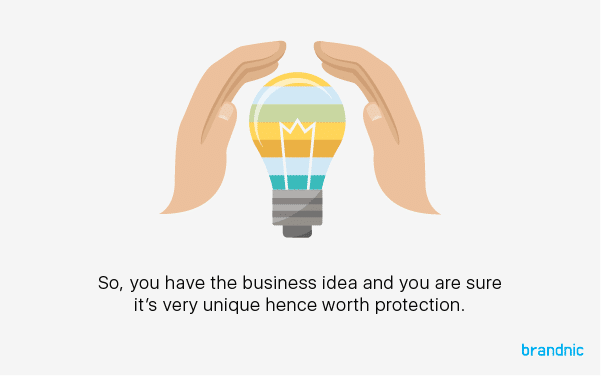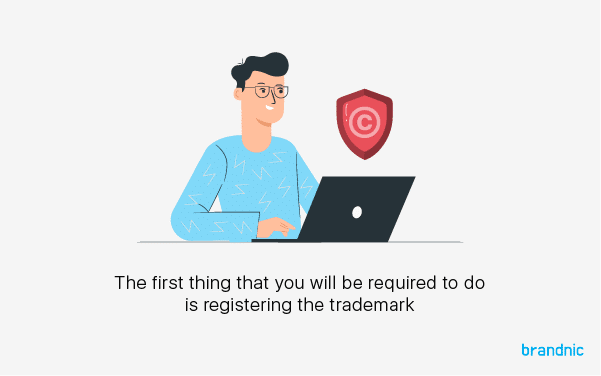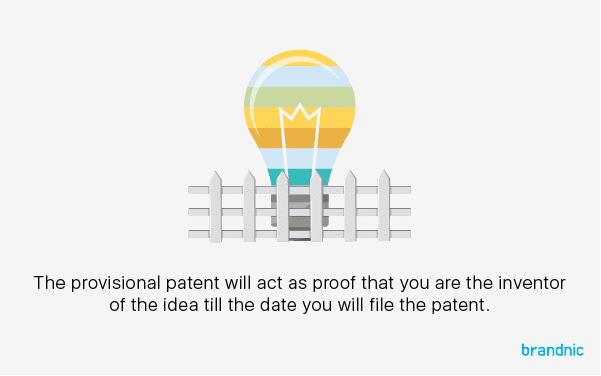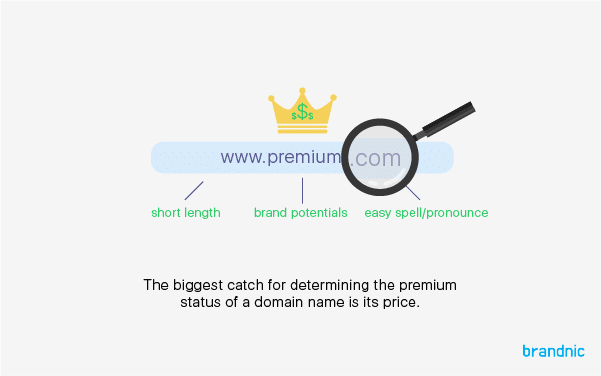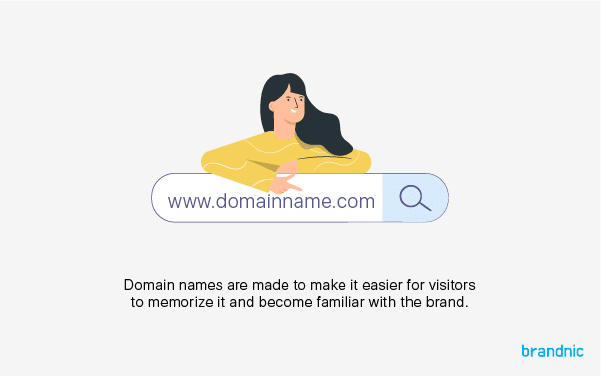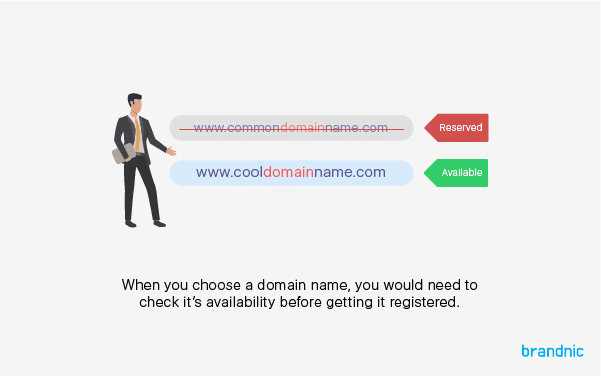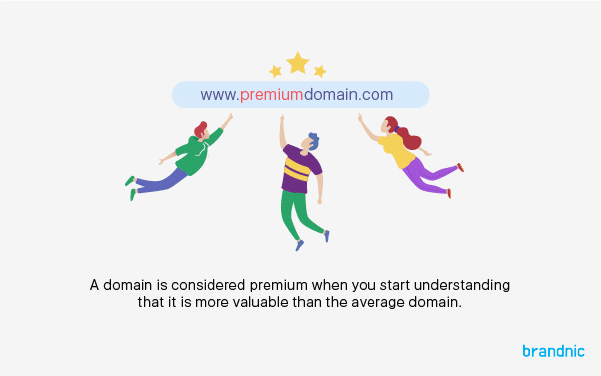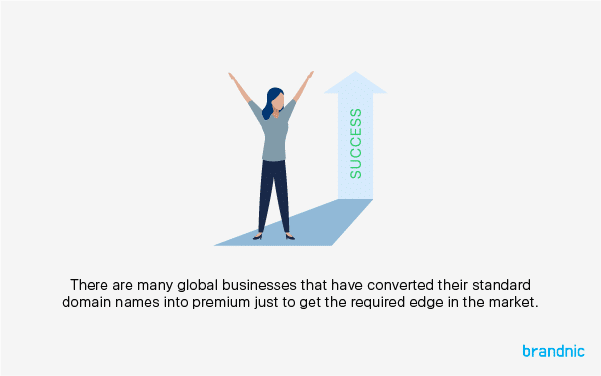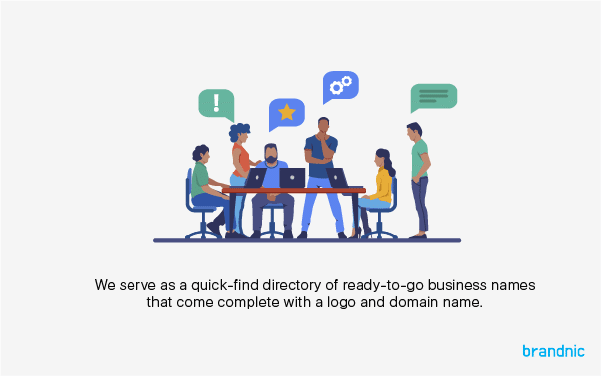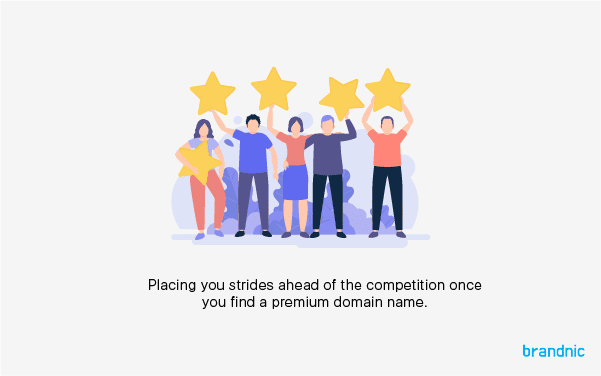Read Time: 12 minutes
Table of Contents
1. Types of Branded Domain Names?
2. The Prominence Brandable Names
3. How to Pick the Right Brandable Name for Your Business?
4. Final Thoughts
The digital landscape is quite expansive that is filled with endless businesses that are catering to basically every human need. With the market being crowded with options, companies are fighting tooth and nail to stand out from the crowd. And the brandable domain name is the primary step towards creating this unique identity.
Basically, it is an online address of your business that you have registered for your website. It is a significant part of your business’s online identity.
For example, Amazon.com, Alibaba.com, eBay.com, etc. are some of the brandable names that dominate the e-commerce market.
In this article, we will be delving into all the important aspects associated with a brandable name and how to choose an ideal one for your business.
Types of Branded Domain Names?
A quality domain and startup name can drive considerable traffic to your site, resulting in rising sales.
If you are a startup seeking the perfect domain name, you will need to find something that’s easy to pronounce.
An easily pronounceable name helps you strengthen the value of your brand, will differentiate you from the competition and establish you as a leading player in your field.
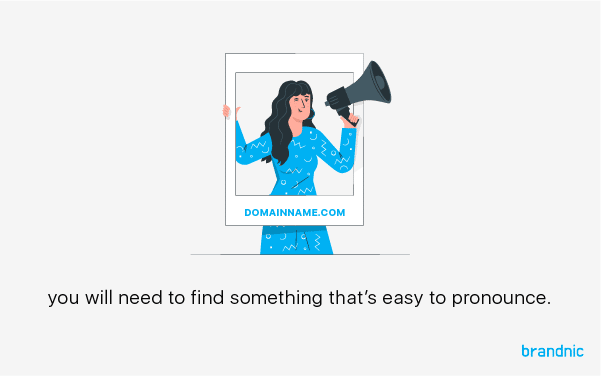
3 – Types of the brandable domain names.
Branded names can be anything that represents your business. They are often twisted, made-up words that might not even exist in the dictionary. They make more metaphorical sense than descriptive. Your brand name can be registered or unregistered; however, it is recommended to opt for the former one. Moreover, you cannot choose a brand name that is already being used by another company on the web.
The following are some of the common kinds of branded domain names that you will come across…
1. Brand Names that are Based on Keywords
In a keyword-based brand domain name, you will see that the keyword will hit the main product or services provided by the company. Moreover, it can also show the brands positioning in the particular industry or the emotions that it stimulates in the users. “webdevelopment.com”, “cheapsmartphone.com”, “buywatches.com” etc. are some of the examples of keyword-based brand names.
To a certain degree, using a keyword-based brand domain helps your business. When users search a particular keyword on Google, they are likely to click on websites that have at least one keyword. For instance, if a user searches for a “cheapiPhone”, a domain name with keywords like “buyiphone” or “buycheapiPhone” is likely to get more clicks.
2. Evocative Brandable Domain Names
An evocative brandable domain name resembles an image, mood, or memory. These words have no direct relationship with the product or services provided by the company. Instead, these words make a metaphorical association by painting a strong emotion associated with your brand.
Amazon.com, Uber, Apple.com, etc. are some of the leading companies with brand names that suggest the value they offer to the customers rather than directly naming their services.
This is a great way to pique the interest of your target audience and create a unique identity. However, at times, companies tend to go overboard with this idea and only end up confusing the audience.
3. Vessel Brandable Names
These are types of brand names that are entirely made up and no relevance to any search term. The crafted name enables you to establish a unique identity that is independent of any preconceived notion or opinion, thereby providing you with maximum brand control.
These words mean nothing before companies brand them and become popular among the audience. Google.com, Etsy.com, Yahoo.com, Instagram.com, etc. are some of the prominent examples of these kinds of brand domain names.
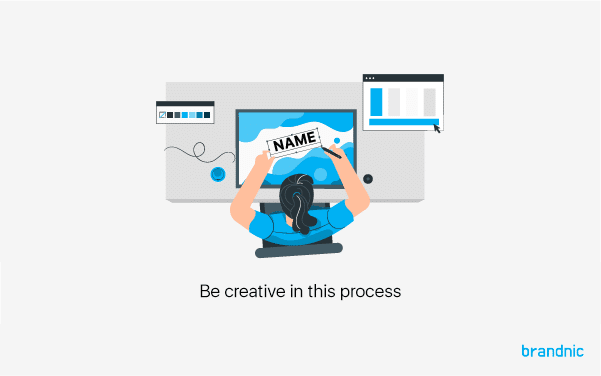
Show some creativity when choosing a brand name.
The Prominence Brandable Names
When it comes to building a brand, you will have to put in years of planning, strategizing, and investing. The story of some of the biggest brands in the world would rightly confirm this fact. Coming up with a unique brand name is something that needs a lot of thought. Tech pioneer Steve Jobs named his company Apple based on his Fruitarian diet as it sounded simple, spirited and fun. He thought this is a brand name that people would find approachable and rest as they say is history.
Let’s talk about the brands that we cannot imagine modern lives without, like Google, Facebook, Instagram, etc.
What would these brands be without their names? Nothing! Brandable names allow companies to connect with people and create a unique identity that stays with them. The connection that brand names are able to build between a company and its customers is the primary reason why it is so important.

The brandable names could be anything .. but it must sound interactive.
So if you are starting a new business, a catchy name and an attractive logo is the primary step towards creating an identity for yourself in the market.
Your brand name will eventually evoke emotion among your customers that will resemble with kind of service you extend.
As we discussed in the beginning, today, customers have unlimited choices; therefore, a start-up must work towards establishing a strong brand identity that is unique, captivating and consistent. Fortunately for companies, there is no manual that they have to follow to register their brand name; it could be anything they want as long as the name is not already in use.
While there are tons of aspects that go into building a brand, the name is the first thing that customers come across when you tell them about your business. And good brand names never go unnoticed; they become your brand’s ambassadors signifying its value, tone, and position.
Furthermore, a brand name is also a way to building an emotional connection with the audience; therefore, it should be something sensible that customers can connect within the long term. Your brand name, logo, and communication together weave a story of your business that can be impactful in building trust among your customers and further contribute to the success of your business.
How to Pick the Right Brandable Name for Your Business?
With businesses fighting to buy unique names to thrive in the market, selecting an impressive and unique brandable name has become more complex than ever. There is no hard and fast rule when it comes to choosing a brandable name, and there is no one-size fit all approach as well.
The keyword-based domain might work for some businesses, whereas others would get more benefits from evocative brand names.
On the whole, this process can be a bit complex when you are not aware of the basics of picking out a brandable name for the business. Below we have listed out some of the important factors that will help you select the right brandable name for your business.

Thinking a brandable domain name is not an easy task.
1. Simplicity Goes a Long Way
With a brandable name, your primary goal is to stand out from the crowd and make a distinctive identity for yourself. Often startup focuses on picking out over-the-top names that end perplexing the users. You must understand that the customers’ no longer thing complex is fun. With your brandable name, you need to be specific and simple.
Select names that are clear, relevant and memorable.
For example, Uber.com (meaning super) provides rental cab services across the world. This name is not only brief but also catchy and has a clear association with the kind of service that this company provides and the value it stands for.
The simplicity of this brand name is what makes it so popular and memorable among the audience. Another thing to note about that name is how easy it is to pronounce Uber.
You don’t want a name that your customers cannot even say out loud.
Your customers have to spell your brand name to others; then it is clear that your name will not stick around. When they keep misspelling your domain name, customers will get tired of it, and you will end up losing a lot of potential traffic. Companies must understand that customers are looking for easy-to-understand solutions that are easy to remember amidst their busy schedules. So keep it simple enough for your customers to find you.
2. A wise decision to go with an extension of a “.COM” domain name
When it comes to selecting an extension, it is better to stick with .com. This is one of the areas where you should not think too much about being unique. An extension like .pro and .me may sound cool, but there are not as effective as .com. The simple reason behind this is that the majority of the web is familiar with .com. In fact, 75% of the domains on the web are .com extension. Moreover, if you are not able to get .com, then other popular option for you is .net, .co, .org, etc.
Start with one of these domain extensions, and when you have become established, then you can focus on acquiring .com. If a big brand has already acquired your .com extension, then you will need the money to get it from them. If you are a local business and don’t aim to move to expand your business further, then you can focus on acquiring country specific extensions like .in, .au, .uk, .de, etc. Platforms like Brandnic help you search out the availability of your domain name, and also suggest other options that might be suited for your business.
3. Keep Your Domain Name and Company Name Similar
This is a subject matter of debate among many, but having the same brand and domain name can be a simple and safe solution. This is a great way to ensure that your target audience remembers you, because with a different company and domain name they might get confused. Moreover, considering that most of the website traffic is derived from navigation and search engines, the single name makes it easier for your customers to connect with you.
With your company already registered, it will be easier for you to acquire the domain name and it will be relevant to you. If your business name is too long for a domain name, you can shorten it. Click to learn more about short domain names selection.
For instance, the website of the National Center for Biotechnology Information has a domain name with its abbreviation “NCBI.ie.”

You have to make up your mind for the best possible outcome when making a brand name.
4. Keep Your Customers in Mind
When acquiring a brandable name for your business, you have to think from the customer’s point of view as you are making it for them. Look out for names that might interest them instead of choosing the names that you are comfortable with. What terms or ideas they would normally use with regards to your niche? Additionally, it is equally important to analyze foreseeable changes and restrictions when thinking of a brandable name.
The name you choose should be easy to find and should be able to access as an official company name as well.
Your domain name and company name should be complementing each other if not similar.
The reliability, relevance, and value that a domain name presents hold a lot of significance in the eyes of the customer. So when you are thinking of a name, you should keep your audience in mind rather than your perspective.
5. The Art of Including Keywords
As stated in the previous section, keywords in a domain name help to a certain degree and that too when done rightly. Choosing representative keywords has multiple benefits. To begin with, it directly contributes to your SEO ranking. Secondly, people prefer a website that explains itself through the domain name. Moreover, if you are choosing keyword as your domain name, make sure you opt for more specifically targeted keywords.
If you sell secondhand iPhone, then you should target search terms like “cheapiPhone” rather than running after “buyiPhone”. This way, you will get traffic that has a better probability of converting into leads. Using keywords on your domain name can be especially helpful when your business serves locally.
6. Be Flexible
Businesses constantly need to modify depending on the growing market; so you should not restrict yourself by choosing a too specific domain name. When it comes to choosing brandable names, being a bit vague can turn out to be in your favor. Since you are just starting out, it is evident that over the course of time, your business process will evolve.
Being flexible with your brandable name will ensure that you continue to have opportunities to develop strengths.
For instance, you started by selling a cheap iPhone and named your website “cheapiPhone.com”, but later you also began dealing with Android as well. So when users who need a cheap Android phone will see your domain name, they are not likely to click on it. However, if your domain name were something like “cheapsmartphones.com,” then you would have better traffic on your website.
Besides, the domain name you want may be taken or too expensive for your current budget. So you could start off with a closely related domain name and optimize it effectively so that it helps you in driving traffic and revenue. And once you have a strong stand in the market, you can bid for the domain name you initially wanted and purchase it.
7. Get Creative
Your brandable domain name will be used as your identity so you might already have some idea about how you want to appear in front of the audience. So write down, all the words, phrases, descriptors, ideas, value, etc. that are associated with your company. Some of the key pointers that you should keep in mind include –
- Avoid hyphen
- Keep it short
- Don’t fuss about SEO or keywords
If you are too confused, there are platforms that can help you out. Brandnic is one of the platforms that is dedicated to providing brandable names to the users. So you can brainstorm your ideas there. List out all the potential brandable names that you might think is apt. Don’t be too picky at this point and limit your options. Be open to ideas and new suggestions as you are just starting out and have a limited budget to dispose of.
8. Check For Uniqueness
List down all the brandable name ideas that you have in mind and check whether or not they are taken. Simply run the names on Google one at a time. The point is to identify any relevant companies that are using the same names or closely associated ones. Once you have done the Google search and verified the uniqueness of the names, the next step is to run a quick trademark check-in that particular category and market.
You have to be realistic with your expectations as they are likely to be brand with a somewhat similar trademark. So don’t reject your preferred name unless you find it almost too identical with some other one and it will confuse your audience.
Doing research beforehand will ensure that you pick a name that has its own identity and will not be confused with other brands.
You don’t want to leave any room for ambiguity and confusion as it risks your traffic being diverted to other websites.
9. Connecting Social Media
Irrespective of your operational nature, social media marketing has become imperative for the success of any business. People spend a significant amount of their time on social media and come across various businesses from there. So when you have a social media handle for your domain, it will make it easier for you to direct the traffic to your main website from social media.
So you will want to pick out a brandable name that also has social handles available. While it is important to add social media handles, don’t stress too much on this point that you end up losing a good brandable domain name. If the handle is not available, you can contact the current owner and purchase it from him/her. It should be among the last steps as you don’t want to miss out on the right name while looking for a social media handle.
10. Monitor your Competitors
The whole point of picking a brandable name is to be distinctive from the rest. In order to do the same, you must know what your competitors have already done. List out all the high performing competitors’ domain and assess their brandable name.
Understand why the names signify and why it is working for them. Take insights from them, but do something completely different.
Evaluate what your customers might be thinking when they want to buy your particular product or service, and then come with a unique idea that will help you stand out. Along with providing you with ideas, analyzing your audience will help you determine what all have been done and what you should avoid doing.
Final Thoughts
There are multiple approaches when it comes to selecting a brandable name. Each approach has its own share of pros and cons, and eventually, it all comes down to what the business and the way it aims to build its online personality. The more honest you are with your brand name, the better will be your opportunities.
Brandable names don’t have to showcase your business name and its exact keywords to attract customers.
Instead, you can focus on the character, qualities, and values of your business that might stimulate some emotion among your target customers. These are less descriptive names that hold strong potential to create brand power. Moreover, you can use brandable names to add a versatile touch to your business.
Basically, you are free to do whatever you want with your brandable name as long as it is not taken by someone else. However, when you choose a brandable name that is not thought-out well, you are risking your business’s visibility and its future success. When you are too confused about choosing the right brandable name, you can take assistance from the domain generator tool.
Brandnic has brandable business names to be used for any business and it gives you the confidence to run your business with ease.
Brandnic also has a tool that helps in finding the right brandable name for your business. It has an easy-to-use interface that provides you with tons of brand name suggestions based on your niche. So if you don’t have enough time to spend on research, handover the task to Brandnic and it will do all manual for you and present you with various interesting and engaging brandable name suggestions that you can opt for your business.
Above are some of the important things that you should consider while picking out a brandable domain name. Some of the points might be relevant to your business while others don’t; so eventually it all depends on your business and its value and perspective.
